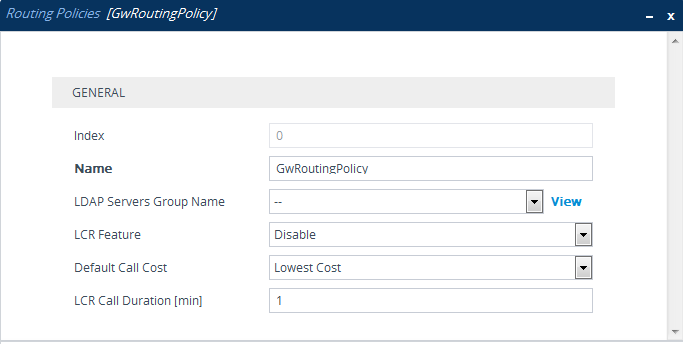Configuring a Gateway Routing Policy Rule
The Routing Policies table lets you edit the default Routing Policy rule. The Routing Policy is used for Gateway call routing and defines the following:
| ■ | LDAP server (LDAP Server Group) for LDAP-based call routing (LDAP or Call Setup Rules queries). LDAP-based routing is applicable to Tel-to-IP routing (Configuring Tel-to-IP Routing Rules) and IP-to-Tel routing (Configuring IP-to-Tel Routing Rules). |
| ■ | Enables Least Cost Routing (LCR), and defines default call cost (highest or lowest) and average call duration for Tel-to-IP routing rules that are not assigned LCR Cost Groups. The default call cost determines whether matched routing rules that are not assigned a Cost Group are considered as a higher or lower cost route compared to other matching routing rules that are assigned Cost Groups. If you disable LCR, the device ignores the Cost Groups assigned to Tel-to-IP routing rules in the Tel-to-IP Routing table. LCR is applicable only to Tel-to-IP routing. |
The following procedure describes how to configure Routing Policy rules through the Web interface. You can also configure it through ini file [GwRoutingPolicy] or CLI (configure voip > gateway routing gw-routing-policy).
| ➢ | To edit the Routing Policy rule: |
| 1. | Open the Routing Policies table (Setup menu > Signaling & Media tab > Gateway folder > Routing > Routing Policies). |
| 2. | Click New; the following dialog box appears: |

| 3. | Configure the Routing Policy rule according to the parameters described in the table below. |
| 4. | Click Apply. |
Routing Policies Table Parameter Descriptions
|
Parameter |
Description |
||||||
|---|---|---|---|---|---|---|---|
|
'Index' [Index] |
(Read-only) Displays the index number of the table row. |
||||||
|
'Name' name [Name] |
Defines a descriptive name, which is used when associating the row in other tables. The valid value is a string of up to 40 characters. The default value is "GwRoutingPolicy". |
||||||
|
'LDAP Servers Group Name' ldap-srv-group-name [LdapServersGroupName] |
Assigns an LDAP Server Group to the Routing Policy. IP-to-Tel and Tel-to-IP routing rules that require LDAP-based routing (or Call Setup Rules) use the LDAP server(s) assigned to the LDAP Server Group. By default, no value is defined. For more information on LDAP Server Groups, see Configuring LDAP Server Groups. |
||||||
|
'LCR Feature' lcr-enable [LCREnable] |
Enables the Least Cost Routing (LCR) feature for the Routing Policy.
For more information on LCR, see Least Cost Routing. Note: LCR is applicable only to Tel-to-IP routing. |
||||||
|
'Default Call Cost' lcr-default-cost [LCRDefaultCost] |
Defines whether routing rules in the Tel-to-IP Routing table that are not assigned a Cost Group are considered a higher cost or lower cost route compared to other matched routing rules that are assigned Cost Groups.
|
||||||
|
'LCR Call Duration' lcr-call-length [LCRAverageCallLength] |
Defines the average call duration (in minutes) and is used to calculate the variable portion of the call cost. This is useful, for example, when the average call duration spans over multiple time bands. The LCR is calculated as follows: cost = call connect cost + (minute cost * average call duration) The valid value is 0-65533. The default is 1. For example, assume the following Cost Groups:
Therefore, for calls under one minute, "Weekend A" carries the lower cost. However, if the average call duration is more than one minute, "Weekend B" carries the lower cost. |